Regarding nailing, pin nailers and finish nailers are two of the most popular tools. But which is better for your project: pin nailer vs finish nailer? Do not worry. In this article, you can find all the information you need.
Pin nailers and finish nailers are two types of nail guns commonly used in woodworking projects. These tools are used to drive nails into wood, but they look, work, and are used differently.
A pin nailer is a nail gun that uses tiny nails, typically between 18 and 23 gauge. Finish nailers are designed for larger nails, usually between 15 and 16 gauge.
However, selecting the correct nailer can improve the quality and efficiency of your work. Therefore, weighing each type’s pros and cons is essential. This article compares pin and finish nailers to help you choose the proper nailer for your projects.
Differences Between: Pin nailer vs Finish Nailer
A pin nailer and a finish nailer are two different types of nail guns used in woodworking and construction projects.
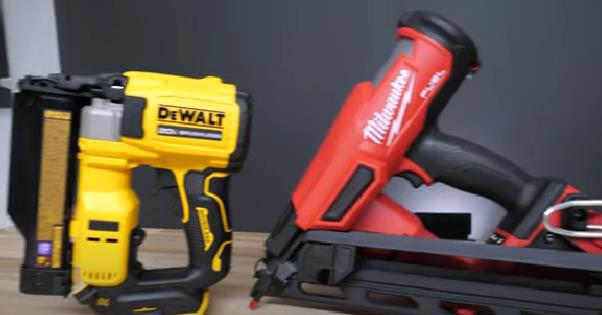
The main differences between the two are as follows:
Nail Size:
Finish nailers are used for larger nails that range in length from 1 inch to 3 1/2 inches, whereas pin nailers are used for smaller nails that range in size from 3/4 inch to 1 3/8 inch.
Purpose:
Pin nailers are used for small jobs and light-duty tasks, like temporarily attaching small trim pieces or holding two pieces of wood together. On the other hand, finish nailers are used for more heavy-duty tasks like installing baseboards, crown molding, and other decorative trim pieces.
Nail Depth:
Pin nailers are intended to sink nails just beneath the surface of the wood, leaving only a tiny pinhead visible. Finish nailers, on the other hand, are designed to sink nails deeper into the wood, exposing only the nail head.
Power:
Pin nailers are usually less powerful than finish nailers. Because of this, they are easier to control and handle, but they aren’t as good for rigid materials or heavy-duty jobs.
Price:
Because pin nailers are less expensive than finish nailers, they are affordable for those who only need to use them for light-duty projects.
Finally, the choice between a pin nailer and a finish nailer is determined by the type of project and the type of nails required. Finish nailers are better suited for heavier-duty projects, while pin nailers are better suited for delicate work and light-duty applications.
Pin Nailers or Finish Nailers: Comparsion Table
The comparison table between pin nailer vs finish nailers explains the differences between pin nailers and finish nailers. By looking at the comparison table, you can figure out which type of nailer will work best for your project.
| Feature | Pin Nailers | Finish Nailers |
|---|---|---|
| Size | Smaller | Larger |
| Nail Thickness | Thinner | Thicker than pin nailer |
| Project Type | Delicate | Larger |
| Nail Gauge | 23-gauge | 15 or 16-gauge |
| Magazine Capacity | Smaller | Larger |
| Depth of Drive | Shallower | Deeper |
| Anti-Jam Feature | No | Yes |
| Weight | Lighter | Heavier than pin nailer |
| Noise Level | Quieter | Louder more then pin nailer |
| Recoil | Less | More |
In terms of similarities, pin nailer vs finish nailer, both pin nailers and finish nailers are powered by compressed air and are designed to make the job of driving nails into wood easier and faster.
In-depth Review of Pin Nailer
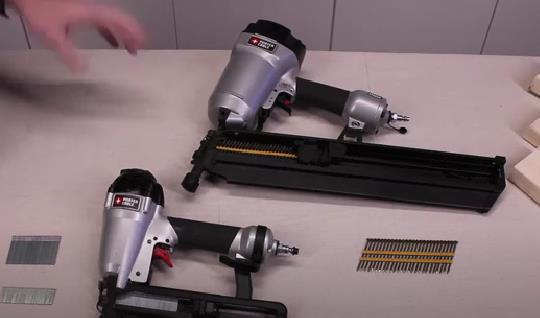
Pin nailers, also known as Brad nailers, is used to drive thin, small nails into wood. They are commonly used for small projects like trim work, cabinetry, and furniture construction.
Because of their small size, lightweight, and ease of maneuverability, pin nails are a popular choice for intricate and detailed work. One disadvantage of pin nails is that they are not as strong as finish nailers and may not be appropriate for heavier-duty projects.
Pin nailers are available in a variety of styles, including straight, angled, and narrow crown models. The type of pin nailer you select will be determined by the type of project you’re working on, as well as the type of nails you’re using.
Pin nailers are great for smaller projects that need precise and detailed work, like trim work, building cabinets, and making furniture.
Pros:
- Perfect for small spaces and precise projects.
- Perfect for delicate projects involving thin materials.
- Smaller hole size for a more finished appearance.
- It is less expensive.
- The operation is now quieter.
- Drive at a shallow depth to protect the workpiece.
- With fewer reloads, the magazine capacity is reduced.
- It is lightweight, easy to use, and reduces fatigue.
- Simpler controls make it easier to use.
- Suitable for first-time nail gun users.
Cons
- Pin nailers may not work for heavy-duty jobs because their small nails may not hold large chunks of material.
- Pin nailers’ smaller magazines make loading and reloading harder than finish nailers.
- Pin nailers are smaller and lighter than finish nailers, thus they may be less durable.
- Pin nailers need more frequent maintenance than finish nailers.
- Pin nailers have smaller, more intricate parts than finish nailers, making them harder to fix.
In-depth Review of Finish Nailer
A finish nailer is a type of pneumatic nailer that is used for fastening wood trim and other finishings.
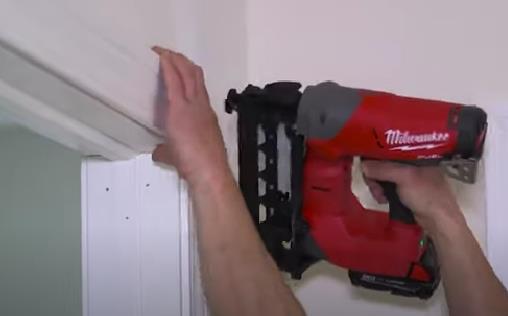
Finish nailers are designed to drive larger nails into wood, making them a popular choice for heavy-duty projects like framing, decking, and flooring.
Finish nailers are good because they are strong and can be used for many different kinds of projects. One disadvantage of finish nailers is their larger size and weight, which makes them less maneuverable and difficult to use for detailed work.
There are also different types of finish nailers, such as straight, angled, and coil models. The finish nailer you select will be determined by the type of project you are working on, as well as the type of nails you are using.
Finish nailers are best for bigger projects that need to be strong and long-lasting, like framing, decking, and flooring.
So, what are the pros and cons of them?
Pros:
- Can be used for a variety of applications, including fastening wood trim and other finishings.
- Relatively easy to use.
- Can be used with a variety of different nails, including finishing nails and brads.
- Finish nailers can handle more nail sizes than pin nailers.
- Finish nailers hold better than pin nailers.
Cons:
- Relatively expensive.
- May be difficult to use in tight spaces.
- Can leave visible nail holes.
Brad Nailer Vs Finish Nailer: Which is better for you?
How to Choose the Right Nailer?
Pin nailer vs finish nailer, Consider the following factors when selecting a nailer:
- Type of material: Different nailers are made of various materials, such as wood, metal, or plastic.
- Type of fastener: Consider the size and type of fastener you’ll be using, such as nails or staples, and select a compatible nailer.
- Power source: Air compressors, batteries, and electrical outlets can all be used to power nailers. Consider the best power source for your job and workspace.
- Portability: If you need to move the nailer around a job site, consider its weight, size, and portability.
- Nail capacity: Consider the number of nails you will be using and select a nailer with a large enough magazine to handle your project.
- Features: Features that make your job easier include the ability to change the depth, the ability to change the exhaust, and safety features.
- Budget: Nailers can range from essential to advanced models with extra features. When selecting a nailer, keep your budget in mind.
Choosing the right nailer for the job is vital to get the best results and make your work easier and faster.
Related FAQ- Pin Nailer vs Finish Nailer
Are pin nailers and finish nailers interchangeable?
No, pin nailers and finish nailers are designed for specific tasks and are not interchangeable. Using a pin nailer for a heavy-duty task or a finish nailer for a delicate task may result in damage to the workpiece or an inadequate hold.
Can I use any type of nail with a pin nailer or finish nailer?
No, it is important to use the correct type of nail for your nailer. Pin nailers require very small nails and finish nailers require larger nails. Using the wrong type of nail can damage the tool or result in an inadequate hold.
How do I load nails into my nailer?
The process for loading nails into a pin nailer or finish nailer can vary depending on the brand and model. Refer to the manufacturer’s instructions for specific instructions, but in general, you will need to open the magazine, place the nails in the correct orientation, and close the magazine.
How do I maintain my pin nailer or finish nailer?
To maintain your pin nailer or finish nailer, make sure to clean it regularly and keep it oiled to prevent rust and wear. Store the tool in a dry place when not in use and avoid exposing it to moisture.
Final Words
Hopefully, you enjoyed my lastest content: pin nailer vs finish nailer. Finish nailers and pin nailers are both essential woodworking and carpentry tools. Each, however, has its own set of characteristics, advantages, and disadvantages.
Finish nailers are larger and heavier than pin nailers, also known as pin nailers. Thin pins between 18 and 23 gauge are used to hold light to medium-weight materials together. Pin nailers are excellent for fine-trim work, upholstery, and decorative projects.
On the other hand, finish nailers attach heavier materials with thicker and stronger nails ranging from 15 to 16 gauge. They are ideal for more extensive and more trim severe work, crown moulding, baseboards, and other carpentry projects requiring a strong and long-lasting hold.
In the end, pin nailers are better for small and light-duty jobs, while finish nailers are better for bigger and stronger jobs. Both tools have specific applications, and which one you use depends on the type of project you’re working on and the materials you’re using.
Hopefully, you are clear on the difference between pin nailer vs finish nailer. If you still have any questions, feel free to comment below.

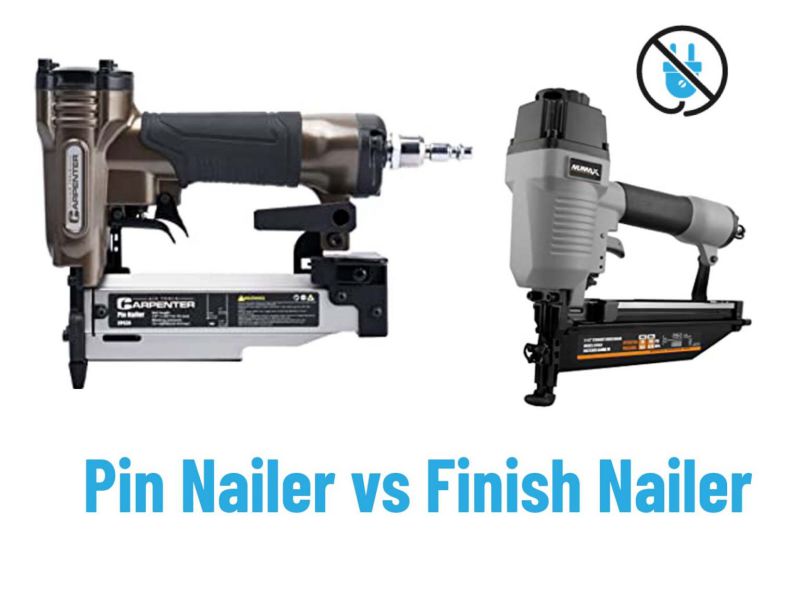
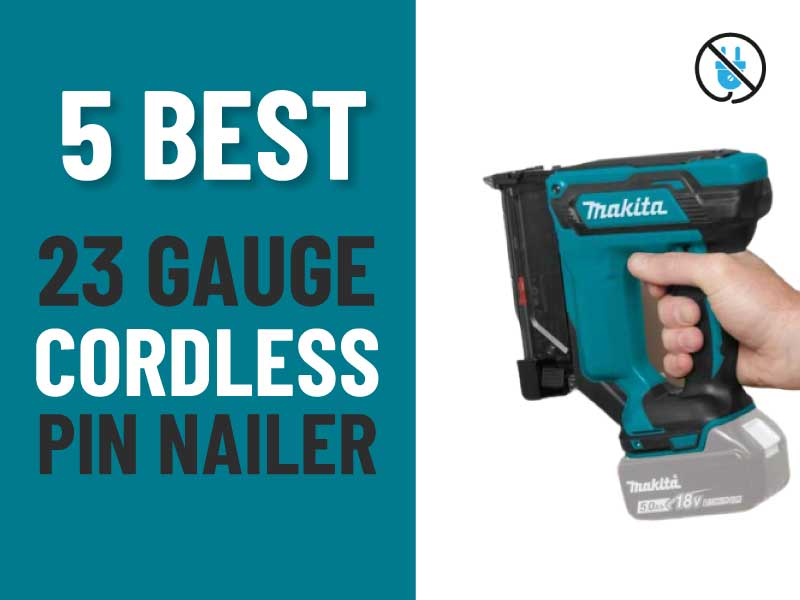
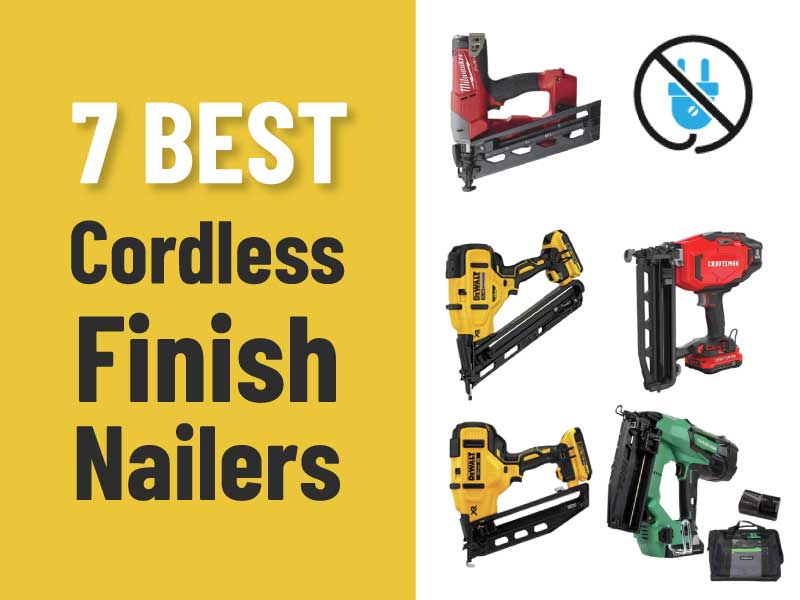
4 thoughts on “The Ultimate Guide to Pin Nailer vs Finish Nailer in 2023”
Comments are closed.